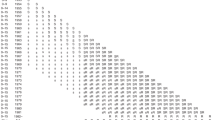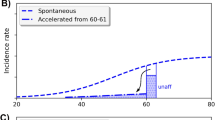Abstract
A modified Mantel-Haenszel analysis of data from the Oxford Survey of Childhood Cancers has shown that cases associated with foetal irradiation (X-rayed cases) accounted for a higher proportion of deaths between 5 and 10 years than of earlier or later deaths. This finding is compatible with somewhat later origins for the cancers actually caused by the radiation exposures (radiogenic cases) than for other (idiopathic) cases which proved fatal before 10 years of age. Therefore the usual time for incurring congenital anomalies (or the first trimester of foetal life) could be the commonest time for initiating childhood cancers. The theoretical implications of this and other findings of the Oxford Survey are discussed within the framework of a theory which assumes that all mutant cells have cancer potentialities and that defects in the immune surveillance mechanism favour multiplication of these cells (or endogenous sources of self-replicating foreign proteins) as well as live pathogens (or exogenous sources of self-replicating foreign proteins).
Similar content being viewed by others
Rights and permissions
About this article
Cite this article
Kneale, G., Stewart, A. Age variation in the cancer risks from foetal irradiation. Br J Cancer 36, 501–510 (1977). https://doi.org/10.1038/bjc.1977.220
Issue Date:
DOI: https://doi.org/10.1038/bjc.1977.220
- Springer Nature Limited
This article is cited by
-
Can prenatal X-irradiation in mice act as an initiator stimulus in a modified 2-stage Berenblum/Mottram experiment with postnatal promotion with phorbol ester TPA?
Journal of Cancer Research and Clinical Oncology (1980)




